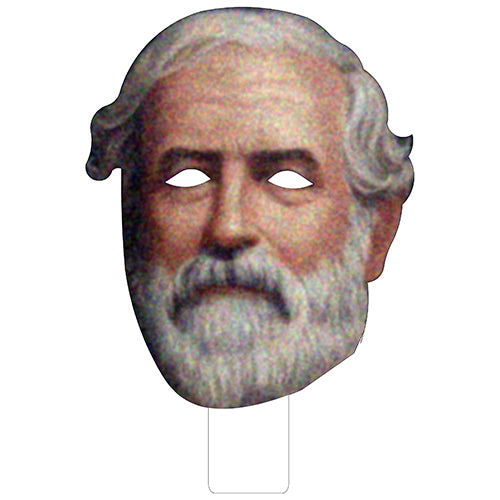Dimensions:
17 in × 13 in

Introduction to Robert E Lee
Introducing our Robert E. Lee Cardboard Mask, an intriguing addition to any historical collection or themed event. Our meticulously crafted mask brings the distinguished visage of the Confederate general straight to your hands, offering a unique opportunity to engage with a figure whose legacy has sparked considerable debate and discussion.
Whether you're a history buff looking to bring a touch of authenticity to your reenactments, an educator aiming to create a more interactive classroom experience, or you're simply seeking a conversation starter for your event, this mask can serve multiple purposes. Crafted from high-quality, durable cardboard, it captures the details of Lee's facial features with remarkable accuracy, making it a standout piece among history enthusiasts and collectors alike.
Amidst the extensive range of cardboard cutouts we offer, the Robert E. Lee mask holds a special place for those who are interested in the complexities of American history. At Life Size Custom Cutouts, we believe in providing products that not only entertain but also educate. By donning this mask, you step into a dialogue with the past, prompting reflection on the nuanced legacies that have shaped our present.
Background of Robert E Lee
Robert E. Lee was a prominent figure in American history, known most notably for his role as a Confederate general during the American Civil War. Born on January 19, 1807, in Stratford Hall, Virginia, Lee was the son of Revolutionary War hero Henry "Light-Horse Harry" Lee III. From an early age, Robert E. Lee demonstrated a strong sense of duty and honor, attributes that would guide him throughout his life.
After graduating second in his class from the United States Military Academy at West Point in 1829, Lee embarked on a distinguished military career. His early service included engineering assignments and playing a pivotal role in the Mexican-American War, where he earned recognition for his bravery and tactical expertise. Despite his deep ties to the Union, when Virginia seceded from the United States in 1861, Lee felt compelled to follow his home state. He resigned his commission in the U.S. Army and took up command of the Confederate forces.
As the leader of the Army of Northern Virginia, Lee earned a reputation as a brilliant tactician and a revered commander. He won several significant battles, including the Second Battle of Bull Run, the Battle of Fredericksburg, and the Battle of Chancellorsville. However, his aggressive strategies also led to substantial Confederate losses, and his defeat at the Battle of Gettysburg in 1863 was a turning point in the war.
Following the Confederacy's surrender in 1865, Lee's legacy became a subject of much debate and reflection. He spent his post-war years advocating for reconciliation and served as the president of Washington College (now Washington and Lee University) until his death on October 12, 1870.
While Lee's strategic military mind remains respected, his association with the Confederacy and its defense of slavery has led to ongoing reevaluations of his place in history. Alexander Hamilton is said to have observed that "Man is a reasoning rather than a reasonable animal” and the same holds true when assessing figures like Lee, whose life and actions continue to be studied with varied perspectives.
Cultural Impact of Robert E Lee
The cultural impact of the Robert E. Lee cardboard mask is a tapestry woven with threads of history, heritage, and controversy. Robert E. Lee, a key figure in American history, served as the commander of the Confederate States Army during the Civil War. For many, he symbolizes a connection to Southern heritage and the complex history of the United States. The use of his likeness as a cardboard mask invites a range of interpretations and feelings, reflecting the ongoing dialogue about historical memory and its modern-day implications.
For some, the Robert E. Lee mask represents an opportunity to engage with history in a tangible way. It can serve as an educational tool, sparking discussions about the Civil War, its causes, and its consequences in classrooms, museums, or at historical reenactments. By wearing the mask, individuals can explore the perspectives of those who lived through this turbulent period, potentially fostering a deeper understanding of the past.
However, the mask is not without its controversies. Given that Robert E. Lee is a figure associated with the Confederacy—a regime committed to upholding slavery—his representation can evoke strong emotions, particularly among those who view the Confederacy as a symbol of oppression and injustice. In recent years, there has been a growing movement to reevaluate monuments and symbols linked to the Confederacy, leading to heated debates about how to appropriately remember and contextualize figures like Lee.
In essence, the Robert E. Lee cardboard mask underscores the multifaceted nature of historical figures and the symbols they become. It exists at the intersection of historical education and cultural sensitivity, reminding us that the way we choose to remember and represent history can have profound implications on our collective understanding and cultural cohesion.













